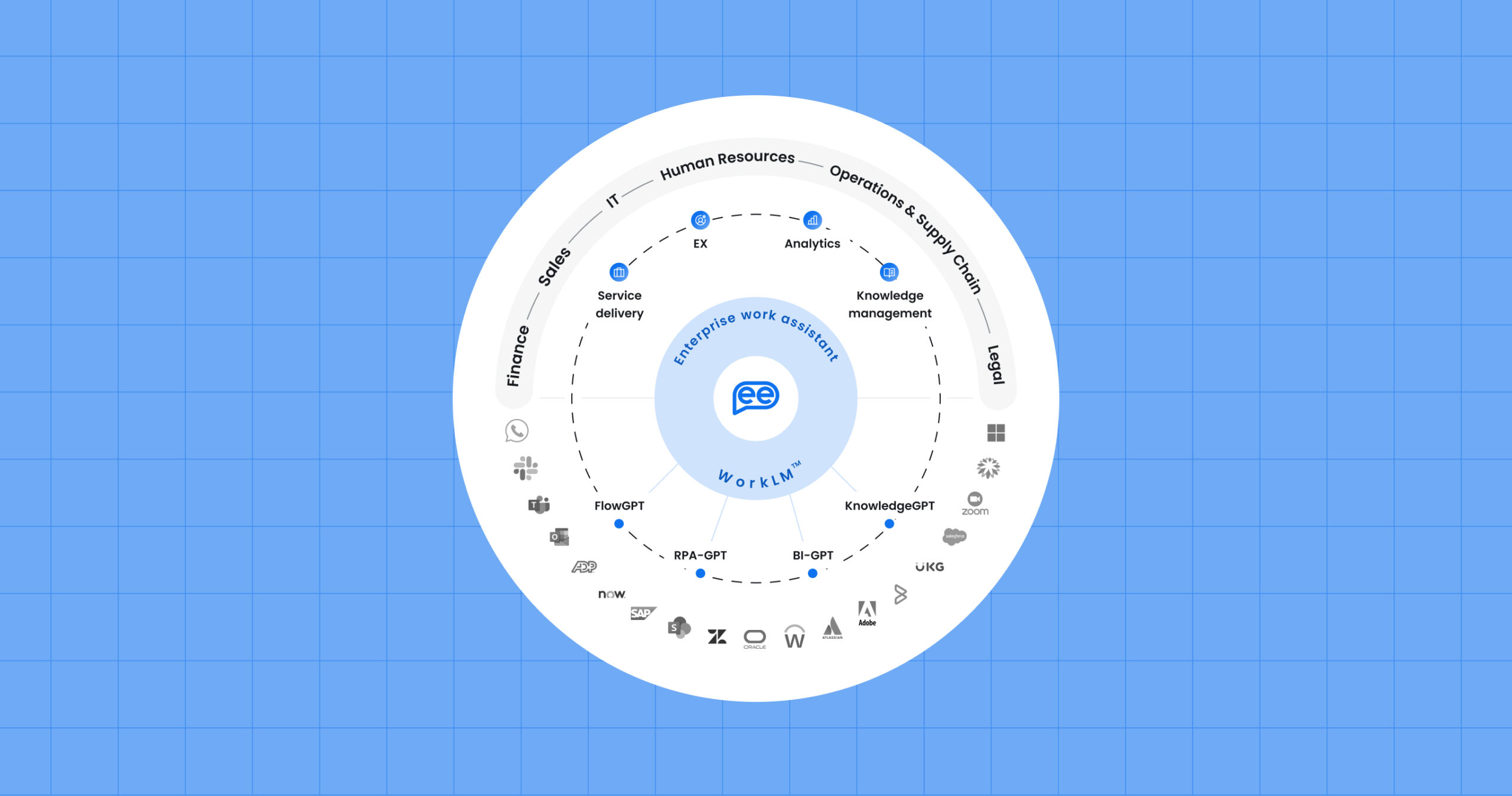Have you caught up with the AI hype? Possibly not.
So much to learn in so little time. And the technology is evolving even as I write this.
But as an organization that has been one of the top AI chatbot companies, continuously trying to up our game at it, while simultaneously investing in upskilling our teams (not just the technology teams) and trying to understand where the latest and greatest AI can help enterprises the most, we’ve jotted down some points to help you choose the right AI vendor.
During multiple calls with CHROs, CIOs, and leaders heading digital transformation initiatives, we found out that you can be at either side of the table and still be overwhelmed with the pace of technology and the resultant fomo. Choosing the right AI vendor is directly tied to the growth and success of your organization, once you decide to head down that path. The impact of this decision extends far beyond the immediate implementation phase; it shapes the organization’s technological trajectory, affects employee experiences, influences customer interactions, and can even redefine the competitive landscape.

As a leader taking up the mantle of digital transformation, understanding the organization’s unique needs, thoroughly evaluating vendor capabilities, and ensuring alignment with strategic goals are essential steps to navigate this transformative journey successfully. Moreover, it demands a commitment to ethical considerations, ongoing monitoring of performance, and a willingness to adapt to the evolving AI landscape, securing not only the present but also the future value that AI can bring to the organization.
Below is an overview of the key capabilities of AI platforms to be considered when selecting a solution. Involving key stakeholders from relevant departments in the decision-making process can lead to a more comprehensive evaluation and ensure that the chosen AI vendor aligns with your organization’s overall strategy and goals.
Strategic Considerations
 Define your objectives and KPIs
Define your objectives and KPIs
What is it that you want to address with AI? Just like evaluating the performance of an employee, identifying KPIs is necessary for this undertaking. Are you looking to enhance employee experience or create personalized action plans for employees? Are you looking to drive intelligent knowledge dissemination or optimize your ITSM processes? Are you looking to make data-driven forecasts of your sales pipeline and revenue streams? For each of these objectives, list down the KPIs and objectives early in the evaluation process as they will guide the selection of the right AI vendor and help measure the success of the engagement after implementation.
Vendor Considerations

 Vendor Experience, Expertise, & Reputation
Vendor Experience, Expertise, & Reputation
When embarking on the AI journey, partnering with an experienced and reputable vendor can make a world of difference. Look for vendors with a track record of successful AI implementations, particularly in your industry or domain. Understanding your industry-specific needs is vital for effective AI deployment. Choose a vendor with expertise in your domain to ensure they can address industry-specific challenges and provide tailored solutions.
Check customer reviews, case studies, and seek references from the vendor’s existing clients to understand their capabilities better. A vendor with a solid reputation will likely have proof of performance of their AI solutions and can provide valuable insights and best practices to optimize your AI initiatives
 Cultural Fitment
Cultural Fitment
Choose a vendor that aligns with your organization’s values and culture. A strong cultural fit fosters collaboration and understanding. Look for a vendor that is willing to work as a partner rather than just a supplier. A vendor who collaborates with you to understand your organization’s unique needs is more likely to deliver successful outcomes. Look for a vendor who is interested in establishing a long-term partnership and is invested in your organization’s success beyond the initial implementation.
Partnership Type
 Proof of Concept (POC)
Proof of Concept (POC)
When it comes to implementing new technology in your organization, it’s important to weigh the potential benefits and risks before committing to a full-scale implementation. This is where a POC (Proof of Concept) comes in. A POC allows organizations to gauge whether the solution meets its intended purpose and is viable for implementation for the larger organization.
 Contractual Agreements
Contractual Agreements
Review the contractual terms carefully, including service level agreements (SLAs), data ownership, termination clauses, and any hidden costs. Define clear SLAs regarding response times, issue resolution, and ongoing support to ensure that the vendor provides timely assistance when needed.
 Intellectual Property (IP) Ownership
Intellectual Property (IP) Ownership
Clarify the ownership of intellectual property rights related to the AI solutions developed during the engagement. Ensure you retain ownership of any customizations or innovations specific to your organization’s needs.
Technical Considerations
 Tech Stack & Integration Capabilities
Tech Stack & Integration Capabilities
Understanding the vendor’s technology stack is essential to ensure it aligns with your organization’s IT infrastructure and can work harmoniously with your existing tools. Consider the compatibility of the AI platform with your existing systems and tools. Seamless integration with your organization’s technology stack will facilitate smooth AI adoption and operation.
 AI Model Training and Data Sources
AI Model Training and Data Sources
Inquire about the vendor’s AI model training processes and the sources of their training data. The quality and diversity of data used for training directly impact the performance and generalization of AI models.
Ethical Considerations
 Data Privacy and Security
Data Privacy and Security
Data is the lifeblood of AI, and protecting sensitive information is paramount. An organization’s data often contains sensitive personal information. The AI vendor should have robust data privacy and security measures in place. Look for compliance with relevant data protection regulations and inquire about their data handling practices, encryption methods, and access controls. Additionally, ensure the vendor provides transparency regarding data usage and storage.
Additionally, if your organization operates in multiple jurisdictions, confirm that the vendor’s AI solutions comply with relevant international and local regulations

 Transparency and Explainability
Transparency and Explainability
AI decisions should not be treated as black boxes. Choose a vendor that promotes transparency and explainability in their AI models. Understanding how the AI arrives at its conclusions is critical for gaining trust, complying with regulations, and identifying potential biases or errors.
 AI Model Bias and Fairness
AI Model Bias and Fairness
Unconscious biases in AI models can lead to discriminatory outcomes. A responsible AI vendor should address bias and fairness concerns during model development and continuously monitor for bias during deployment. Look for vendors that prioritize fairness and have a framework in place to mitigate biases.
 Data Governance and Compliance
Data Governance and Compliance
Data governance is critical for maintaining data integrity, security, and compliance with regulations. Ensure the vendor follows best practices for data governance and adheres to relevant data regulations.
Change Management
 User-Friendly Interface
User-Friendly Interface
A user-friendly interface is essential to facilitate seamless interactions between users and AI systems. The platform should be intuitive, easy to navigate, and require minimal training for end-users to get up to speed quickly.

 Training and Support
Training and Support
AI implementation involves a learning curve, and proper training and support are crucial for successful adoption. The vendor should provide comprehensive training materials, workshops, and ongoing support to help your teams make the most of the AI platform. Choose a vendor that offers comprehensive training and change management support to help your workforce adapt to the AI-driven environment successfully.
 Feedback and Iteration
Feedback and Iteration
Determine the vendor’s process for collecting and incorporating feedback from users to improve their AI solutions over time.
Future Roadmap
 Future Upgrades
Future Upgrades
Ask about the vendor’s future development plans and how they plan to keep their AI solutions up-to-date with the latest advancements in the field.

 Innovation and Research
Innovation and Research
AI is a rapidly evolving field, and a forward-thinking vendor should demonstrate a commitment to innovation and ongoing research. A vendor invested in continuous improvement will be better equipped to address future challenges and leverage emerging AI technologies.
 Scalability and Flexibility
Scalability and Flexibility
AI adoption is not just a short-term solution; it should align with your long-term growth plans. Ensure that the AI platform you choose can scale to accommodate your organization’s evolving needs. Whether it’s handling a growing user base, expanding use cases, or accommodating future technological advancements, the platform should be flexible and adaptable to changing requirements. Ensure that the AI vendor’s solutions can scale with your organization’s growth and adapt to changing needs. Flexibility in customization and integration is essential for a seamless implementation.
Consider the long-term viability of the vendor and their AI solutions. Scalability is vital to accommodate future growth and changing requirements.
Cost-Benefit Analysis
 ROI
ROI
While AI can bring significant benefits, it’s essential to assess the return on investment (ROI) and conduct a thorough cost-benefit analysis. Look for vendors who can help quantify the value of their AI solutions and demonstrate how it aligns with your organization’s financial goals.
Here are the steps to help you evaluate the ROI of an AI vendor’s solution:
Baseline Measurement: Before implementing the AI solution, establish baseline measurements of the identified metrics. This provides a point of comparison to measure the improvement after AI adoption.
Quantify Costs: Calculate the total cost of acquiring and implementing the AI solution, including licensing fees, implementation expenses, training costs, and any other associated expenses.
Timeframe: Determine the timeframe over which you will evaluate the ROI. AI implementations may take time to reach their full potential, so consider both short-term and long-term impacts.
Measurement Period: Ensure that you collect data consistently during the measurement period to accurately track changes and progress.
Direct Benefits: Measure the direct benefits of the AI implementation. For example, if the AI solution auto-resolves repetitive IT tickets like service requests, access issues, and common troubleshooting queries, calculate the time saved, and the associated reduction in IT staff hours.
Indirect Benefits: Some benefits may be less tangible but still valuable, such as improved decision-making due to better data insights, enhanced employee satisfaction due to a smoother experience, or improved organizational agility.
Cost Savings: Quantify any cost savings achieved through increased efficiency, reduced manual work, or minimized errors in business processes.
Productivity Gains: Assess the impact of the AI solution on employee productivity and efficiency, considering how it enables employees to focus on higher-value tasks.
Employee Experience: Gauge the improvement in employee experience, engagement, and satisfaction resulting from streamlined processes and more personalized interactions.
Impact on Revenue: If the AI implementation directly affects revenue-generating activities, evaluate the contribution to revenue growth.
Risk Mitigation: Consider the reduction in compliance risks, legal issues, or errors associated with tasks that the AI solution addresses.
Total ROI Calculation: Calculate the ROI using the following formula:
ROI = (Net Benefit – Cost of Investment) / Cost of Investment * 100
Compare Against Expectations: Compare the actual ROI achieved with the expectations and goals set during the project planning phase.
Consider Long-Term Impact: Account for the potential long-term impact of the AI implementation, as the benefits may compound over time.
Adjustment Period: Allow for an adjustment period, as the initial adoption of AI may require some time for employees to fully adapt and utilize the new tools.
Continuous Evaluation: Continue to monitor and evaluate the AI solution’s performance periodically to identify opportunities for optimization and further ROI improvement. Real-time performance monitoring and analytics are essential for assessing the AI system’s effectiveness and identifying areas for improvement. Look for vendors who provide robust monitoring tools and insightful analytics.
Remember that ROI evaluation should be an ongoing process, and the benefits of AI implementations may extend beyond immediate cost savings. By carefully analyzing both quantitative and qualitative factors, you can gain a comprehensive understanding of the impact of the AI solution on your organization’s overall performance and make informed decisions for future investments.
Leena AI: Your Trusted AI Vendor & Partner
We understand you have business problems, and we’d like nothing more than to help you solve them with efficiency and automation. While we have a great team and algorithm behind our product suite, what we really want to focus on are your business needs.
You want a partner that has enough experience in AI to create seamless processes and workflows and a vision to innovate the digital transformation journey of an enterprise.
AI is not easy, and let no one tell you otherwise. Navigating AI to reap its full potential requires support. It has to be a collaborative effort. You bring the what and when of the problem, and we will take care of the why and how.

25 crucial questions to ask your ITSM vendor
Read the guideHow do I choose an AI platform?
When choosing an AI platform, consider factors like scalability potential, integration capabilities, data security, and available support. Evaluate the platform’s features, user-friendliness, and cost-effectiveness to determine its suitability for your business needs. Make sure it aligns with your business objectives. Look for a balance between advanced functionalities and ease of implementation.
What questions should I ask an AI vendor?
When engaging with AI vendors, it’s essential to pose questions that delve into critical aspects. Inquire about the measures they take for ensuring data security and privacy. Seek details on their capacity for model customization and the quality of training data they employ. Understand the long-term expenses associated with the solution, including both upfront costs and ongoing maintenance. Additionally, ask about their ability to provide integration support and request insights into successful use cases and their future development roadmap.
What is a major benefit of AI vendor service?
A primary advantage of partnering with an AI vendor is the infusion of expertise they bring to the table. These vendors possess specialized skills that can significantly expedite the deployment of AI solutions. With their assistance, you can expect quicker development cycles, reduced time-to-market, and enhanced innovation potential. By leveraging their knowledge and experience, your organization can more effectively navigate the complexities of AI implementation and capitalize on its transformative capabilities.
How much does an AI platform cost?
The cost of an AI platform can vary widely depending on several factors. These include the complexity of the solution, the extent of its usage, licensing terms, level of customization required, features, and the ongoing support and maintenance expenses. While it’s important to consider the upfront investment, it’s equally crucial to assess the long-term value the platform offers. A holistic evaluation should encompass the platform’s potential to drive efficiency improvements, enhance decision-making, and generate tangible business outcomes that can ultimately justify the associated costs.
What is an AI provider?
An AI provider is an entity that offers a range of AI-related solutions, tools, and services to address diverse business needs, primarily aimed at organizational digital transformation. These providers specialize in developing, deploying, and managing AI applications across various industries. Their offerings can include pre-built AI models, customizable frameworks, data processing pipelines, and consulting services. By partnering with an AI provider, businesses can access cutting-edge technologies without the need for extensive in-house development. This allows organizations to leverage AI’s capabilities to optimize processes, gain insights from data, and create enhanced employee and customer experiences.
Who will benefit from AI in business?
The benefits of AI in business extend across multiple dimensions, with various stakeholders reaping rewards. Organizations can achieve heightened operational efficiency by automating repetitive tasks and optimizing workflows. Data-driven decision-making becomes more accurate and timely, leading to better strategic planning and resource allocation. From improved HRSD to accurate sales forecasting, from automated access management to efficient supply chain management – by harnessing AI’s potential, businesses can foster innovation, remain competitive, and unlock new avenues for growth and expansion.
Where should I start with AI?
Embarking on an AI journey involves several strategic steps.
- Begin by identifying specific business challenges that could benefit from AI-powered solutions. Assess the availability and quality of relevant data sources, as data is the foundation of effective AI implementation.
- Consider starting with a pilot project to validate the feasibility and potential impact of AI in a controlled environment.
- Educate your workforce about AI concepts, capabilities, and implications to ensure successful adoption and collaboration.
As you gain experience and confidence, gradually expand the integration of AI across different processes and departments, continually measuring and optimizing outcomes for sustainable growth.






